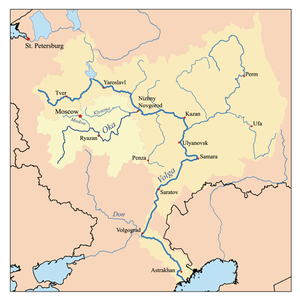Oka (river)
| Oka (Ока́) | |
|
The Oka riverbank in Nizhny Novgorod
|
|
| Country | Russia |
|---|---|
| Cities | Oryol, Kaluga, Serpukhov, Kolomna, Ryazan, Murom, Dzerzhinsk, Nizhny Novgorod |
| Source | |
| - location | Oryol Oblast |
| - elevation | 226 m (741 ft) |
| - coordinates | 52°21′45″N 36°13′20″E / 52.36250°N 36.22222°E |
| Mouth | Volga River |
| - location | Nizhny Novgorod |
| - elevation | 67 m (220 ft) |
| - coordinates | 56°19′55″N 43°58′53″E / 56.33194°N 43.98139°ECoordinates: 56°19′55″N 43°58′53″E / 56.33194°N 43.98139°E |
| Length | 1,500 km (932 mi) |
| Basin | 245,000 km2 (94,595 sq mi) |
| Discharge | |
| - average | 1,260 m3/s (44,496 cu ft/s) |
|
Map of the Volga watershed with the Oka highlighted
|
|
Oka (Russian: Ока́, IPA: [ɐˈka]) is a river in central Russia, the largest right tributary of the Volga. It flows through the regions of Oryol, Tula, Kaluga, Moscow, Ryazan, Vladimir, and Nizhny Novgorod and is navigable over a large part of its total length, as far upstream as to the town of Kaluga. Its length exceeds 1,500 kilometres (930 mi). The Russian capital Moscow sits on one of the Oka's tributaries—the Moskva River.
Max Vasmer connects the name of the river to the Gothic аƕа, Old High German aha, Latin aqua, which all mean either "water" or "river" (cf. ).Oleg Trubachev traces the origin of the name to the Baltic languages: the Baltic tribe of Galindians lived in the western part of the Oka basin prior to the arrival of the Slavs.
Historically, the river gave its name to the Upper Oka Principalities, situated upstream from Tarusa. In 1221 Grand Duke Yuri II of Vladimir founded Nizhny Novgorod, later to become one of the largest Russian cities, to protect the Oka's confluence with the Volga. The Qasim Khanate, a Muslim polity, occupied the middle reaches of the Oka (around the city of Kasimov) in the 15th and 16th centuries.
...
Wikipedia


